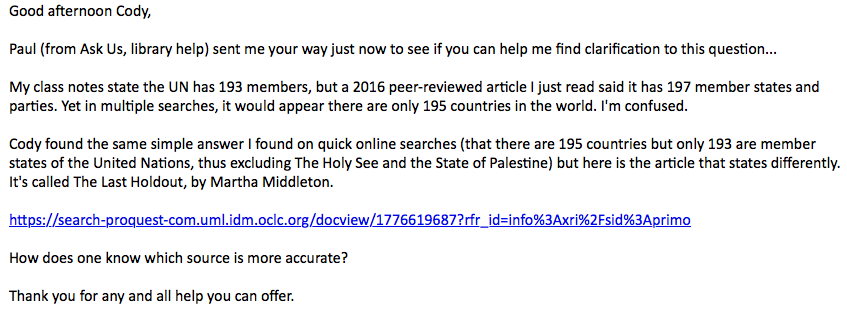Digital Deceit
Teaching Information Authority in Education Research
Cody Fullerton
North Dakota-Manitoba ACRL Chapter Symposium
University of North Dakota, Grand Forks, ND
May 16, 2022
Overview
- Student Night Against Procrastination (SNAP)
- Students wanted MORE
- Discussions with faculty members
- Planned the class with one professor
- Students are often ill-equipped in this area
- Arts-based BEd. course
- First taught in January 2020
How This Project started
The first class
There seems to be a lot of disinformation on the internet
Disinformation:
False information deliberately presented as true or real
Misinformation:
False information unintentionally presented as true
Disinformation is everywhere:
Cognitive Bias
Humans have a tendency to believe or look for information that:
(1) confirms the beliefs they already believe
(2) makes them feel good about themselves
(3) makes people they care about look good
Humans have a tendency to discount information that:
(1) questions things they already believe
(2) makes them feel bad about themselves
(3) makes people they care about look or feel bad
Source: Lenker, M. (2016). Motivated Reasoning, Political Information, and Information Literacy Education. portal: Libraries and the Academy, 16(3), 511-528.
Check yourself before you wreck yourself
- Try and find information that disproves your theory or opinion
- Think of any possible counter arguments
- Remember we all have biases
Test time!

Journal Article
- Fake News, Artificial Intelligence, Censorship
- Our class as a case study
- Top 10 tips for Educators
- We wanted this paper to be useful to teachers!
- Open Access
Journal Article
- Taught the class again in January 2021 and 2022
- Students were assigned our article before the class
- Think about the content
- Favourite section
- What can we improve?
Subsequent classes
- Discussion of cognitive bias
- Addressing the real need for this subject in K-12
- Distinction between misinformation, disinformation and weaponization
Likes
- Digital divide and how that impacts access to information
- More explanation of the term "critical thinking" especially because schools reinforce student's dependance on digital information
Critiques
Subsequent classes
〞
Though their conclusion summarizes and compels us to address the needs of our students, there could have been more attention given to the individual and societal repercussions. Though Black and Fullerton indeed provide a footnote alluding to the ensnaring qualities of non-critical information consumption (p. 14), more attention could have been called to the current polarization of America, and the debilitating and contradictory opinions on vaccinations, masks, and COVID-19 in general. How different could the world look if we had a well-trained and critical eye for our news?
– Student, 2021
- Continue offering this class
- Expand throughout the BEd. program
- Working with the Dean
- Early stages
- Book Chapter
- Education in the Age of Misinformation
- Responsive Pedagogy
- Currently in press
Next Steps
Thank you
Any Questions?
Digital Deceit - ND MB ACRL Symposium
By codyfullerton
Digital Deceit - ND MB ACRL Symposium
- 244



